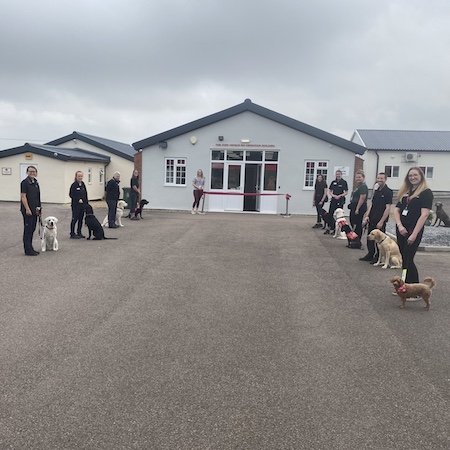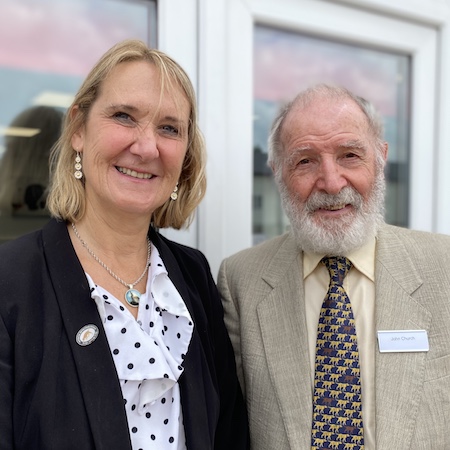John Church Bio Detection Building opening

The building is named after Dr John Church, who founded Medical Detection Dogs with Dr Claire Guest, who together. Together, they recognised the huge potential for advancements in human health that were possible by understanding and harnessing the power of the dogs’ nose.
The first section of the building was acquired in 2011 and a recent major refurbishment and the addition of a third, bespoke Bio Detection training area will enable us to progress concurrent Bio Detection projects with utilising the maximum space in a sustained way.
It’s vitally important for us because as our research develops, we need more space to be able to undertake a greater number of projects and help turn our research into the reality. This will include of new diagnostic tools which revolutionise the speed and accuracy of disease diagnosis and improve patient outcomes.
The building was opened by Dr Church and the Mayor of Milton Keynes, Amanda Marlow, with the help of wire-haired Dachshund, Iggy, who very proudly delivered the official scissors which would cut the ribbon.
Dr Church said: “It is fantastic that we have become aware globally of what we can be taught by animals. We have a lot learn from biology in general – look at what nature has achieved. I first heard anecdotal stories about dogs detecting cancer – such as a lady whose dog seemed almost to be a nuisance by nudging at a mole her leg which turned out to be cancerous and even a puppy constantly bothering at the neck of one of its litter mates, where it transpired that it had which transpired to have a cancerous lump in its throat. I had no doubt this was true and simply had to work with Claire to investigate the possibilities further. The opening of this building is a wonderful moment which beats them all as it shows how much progress we have made and far we have come. And there is still so much to look forward to.”
Claire Guest said: “We’ve worked for many years to prove that dogs can detect disease and always underpinned it with robust scientific evidence and to do this we need facilities. Having spent the last ten years getting deliveringthis strong scientific evidence, we now need to apply this in as many different places as possible and get as many dogs as possible out there saving lives.”
Dr Church, a former Orthopaedic Surgeon, had always known what a significant contribution animals could make to human healthcare and introduced a maggot treatment to the NHS which is now used by hundreds of different hospitals. The stories he’d heard about dogs detecting cancer fascinated him and he had tried and failed to find a dog trainer with the same interest to explore the idea further. In the meantime he’d collected together thirty stories of dogs detecting cancer, including breast cancer and melanoma, and published then them in a long letter to The Lancet.
Unbeknownst to him, animal behaviourist, Claire Guest, had the same idea but hadn’t been able to find a medic to work with. One day Dr Guest heard Dr Church being interviewed on Radio 4 and talking about dogs and disease and immediately got in touch.
Dr Church helped put together the team for the ‘Cancer Detection’ proof of principle study which was published in the British Medical Journal, in 2004 and proved to be a springboard for the charity to showcase to the world how dogs could help detect a range of diseases accurately, quickly and non-invasively.


